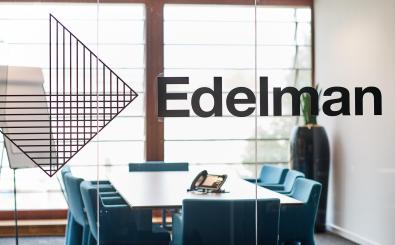Edelman Trust Barometer Special Reports:
"Trust in Brands 2020" & "Brands Amidst Crisis"
During the corona pandemic, people's worries and fears have increased worldwide. The main focus is on the health of one's own family and oneself, but many also fretted about what consequences the crisis could have for the economy and their futures. Against this background, not only did purchasing behaviour change, but also expectations of companies and brands. Current Edelman Trust Barometer 2020 studies on brand trust during the crisis show how seriously changes like these affect the communication strategies of brands.
"The world has changed as a result of the pandemic and so have people. The result is a redefinition of what drives purchase decisions and a realignment of marketing. It is critical that decision-makers recognise this new reality: The traditional appeal of brands has diminished; people now expect brands to address personal and societal needs. Brands that reduce fears, show positivity and hope and empathise with consumer sentiment will win loyalty," says Christiane Schulz, CEO Edelman Germany.
Trust complements marketing-mix as a buying criterion
In a marketing strategy, the five Ps – Product, Price, Place, Promotion, People – must be complemented by another criterion: Trust. Trust follows directly after price and quality as a purchasing criterion, the global survey shows. Irrespective of age or gender, 83 percent of those surveyed in Germany name attributes of trust such as reputation and purpose as a clear criterion for buying into a brand (globally: 88 percent). The trust’s potential can be quantified concretely: for around half of all Germans, trust in a brand is the deciding factor in whether they buy a new brand (48 percent) or remain loyal to a brand (47 percent).
An international comparison also shows that when people trust a brand, 75 percent are loyal to it and 78 percent become brand advocates. The higher the trust, the greater the willingness to spend more money on a product and to buy new products from this brand as well.
Brands should solve social problems and address people's concerns
Brands earn trust by acting in the face of societal challenges. The demands on brands are high: 87 percent of Germans (globally: 89 percent) expect brands to solve social problems. 75 percent also want brands to address their personal concerns (globally: 83 percent). In concrete terms, in relation to themselves, people mentioned issues such as the fair treatment of employees, the provision of reliable information on COVID-19 and empathy for customers and their concerns. As a commitment to society, the global respondents see companies as obliged to donate money to hospitals or aid organisations and to stand up for diversity and against discrimination, among other things.
Trust must be earned with authenticity – advertising no longer achieves its goal
Consumers in this country not only want to see actions and attitudes when they are deciding whom to trust and thus whom to give their money to. They also need to be convinced through new channels: TV spots, posters and advertising on the internet hardly reach their target anymore. 62 percent of those surveyed use ways to avoid advertising online. In the age group between 18 and 34, it is even 78 percent. In this target group, 38 percent have also changed their media habits to see less advertising.
This is particularly alarming for established communication strategies. What companies play out on earned channels such as news media is more likely to contribute to a loss of trust for 66 percent. Influencer marketing has also lost persuasive power: Only 23 percent see influencers with high follower numbers as credible sources that build trust in a brand.
"People want companies to be a reliable source of information that gives them orientation in times of crisis. Brands can play to their strengths here by communicating transparently and authentically," says Christiane Schulz, CEO Edelman Germany.
Communication with tact: Consumer values have changed
The corona pandemic has led to a shift in values. What is most important to global respondents is protecting their own family (+42 percentage points compared to the beginning of the year) and spending time with them (+38 percentage points compared to the beginning of the year). What consumers no longer care about: the image associated with buying a brand (-11 percentage points compared to the beginning of the year) and feeling like a trendsetter (-9 percentage points) or associating brands with adventure and excitement (-5 percentage points).
"Brands need to recognise that consumers now live in a world that starts at home, where personal health and family come first instead of image or status," says Christiane Schulz, CEO Edelman Germany.
Against the backdrop of this shift in values, it is important to put advertising and marketing to the test. 69 percent of the global respondents, for example, see brands as having a responsibility to show appropriate social distancing and mask wearing in their marketing and advertising. Brands should think about public safety first. For example, they should only encourage people to return to shops, restaurants and other public places once restrictions have been lifted (65 percent, globally: 61 percent). A good half of Germans believe that brands should be more restrained in their holiday communications and advertising this year in light of the crisis (55 percent; global: 56 percent).
Concrete action and authenticity pay off
A brand's actions pay off: Brands are four times more likely to gain trust than lose it if they take concrete action on a socially relevant issue. This is shown by the Edelman Trust Management 2020 Tracking Study. However, authenticity is crucial, otherwise there is a risk of losing trust. Almost two thirds (62 per cent; up 2 percentage points since 2017) of global respondents say they have perceived more "trust washing" by brands in the last three years, with strong increases in Germany (+9 percentage points) and the UK (+9 percentage points).
"The public expects companies to take a central role as a positive force for the future of society. To do this, it is necessary to make trust measurable and assessable. To make this clear for companies, we have developed the Edelman Trust Management Brand, a model with which trust can be measured and evaluated. This allows companies to develop concrete measures to build trust and make their brand fit for the future," says Christiane Schulz, CEO Edelman Germany.

